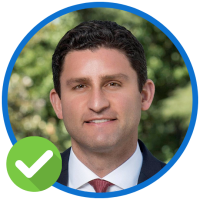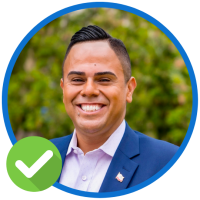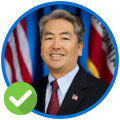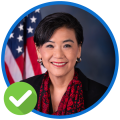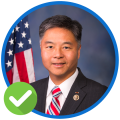Based on our analysis, these three candidates for this position have distinct visions for the district. We recommend that you choose the candidate who best aligns to your values in this race.
Endorsements: Assm. Wendy Carrillo has the endorsement of some progressive groups, including EMILYs List. In previous elections, she has also received the endorsement of AFSCME California, California Labor Federation, Equality California, and Planned Parenthood.
Assm. Miguel Santiago has the endorsement of some progressive groups, including Abundant Housing Los Angeles, Planned Parenthood Advocacy Project Los Angeles County Action Fund, and many labor groups. He has also received the endorsement of many local leaders, including Assm. Speaker Robert Rivas, Assm. Tina McKinnor, Assm. Rick Chavez Zbur, and LA County Sup. Janice Hahn.
Ysabel Jurado has the endorsement of some progressive groups, including California Women’s List, ACCE Action, Ground Game LA, and Democratic Socialists of America Los Angeles. She has also received the endorsement of some local leaders, including LA City Controller Kenneth Mejia, LA City Councilmember Eunisses Hernandez, LAUSD Board President Jackie Goldberg, and Burbank Mayor Konstantine Anthony.
Key initiatives: Assm. Carrillo’s priorities for AD-52 have included 27 bills about affordable housing, health care, and oil and gas. Of these, 12 have been chaptered into law, two have been vetoed, and the rest remain in committee. This session, she has authored and supported legislation to improve the efficiency of clearing rehabilitative service providers to work with the Department of Corrections, create digital data protections for individuals researching reproductive health care, and establish increased accountability plans for the Los Angeles County Affordable Housing Solutions Agency. She scores a lifetime CS of 96 out of 100 on Courage Score, our annual analysis of legislators’ progressive voting records. Based on our Courage Score analysis, Assm. Carrillo has supported nearly all progressive bills that made it to a vote.
Assm. Santiago’s priorities for AD-54 have included 22 bills about government and civil service, criminal justice reform, and post-secondary education. Of these, 9 have been successfully chaptered into law, and the rest remain in committee. This session, he authored AB958 to restore visitation rights for incarcerated individuals, and AB785 to create exemptions in the California Environmental Quality Act for affordable and transitional housing development. He scores a lifetime CS of 95 out of 100 on Courage Score, our annual analysis of legislators’ progressive voting records, and has been designated as an All-Star this legislative session. Based on our Courage Score analysis, Assm. Santiago has supported nearly all progressive bills that made it to a vote.
Jurado is a tenants’ rights attorney and housing affordability activist, which she does to leverage her legal expertise to support increased social equity in her community. In her work, she has defended community members and small businesses against eviction and rent hikes, and has been a strong advocate of establishing achievable pathways to homeownership, and protecting affordability. During the pandemic, she witnessed the policy failures that resulted in housing instability for local residents, and is running for this seat to provide representative leadership for her neighbors.
Governance and community leadership experience: Assm. Carrillo has served in the Assembly since 2017, when she was elected with 54% of the vote. In 2022, she won reelection against a Democratic challenger after earning over 56% of the vote.
Prior to her election to the Assembly, Assm. Carrillo was a journalist who hosted radio and digital media. Assm. Carrillo has been a longtime supporter of workers’ rights.
Assm. Santiago has served in this assembly seat since 2014, when he was elected with over 63% of the vote. In 2022, he won his reelection against a Republican challenger by 58 points.
Prior to his election to the State Assembly, Assm. Santiago was involved in community organizing, and worked on expanding affordable health care and housing. He is a longtime supporter of education, just immigration policies, and economic development.
Jurado has not run for public office before.
Before running for City Council, Jurado established herself as a respected local leader. She earned both her bachelor’s and JD degrees at UCLA, and worked in the Los Angeles Mayor’s Office for three years before entering legal practice. Corruption in the City Council motivated her run for office, and she views the racist rhetoric and blatant gerrymandering that has characterized city government in recent years as antithetical to the needs and interests of Council District 14 constituents. As an attorney and a lifelong resident of the district, her service on the council would focus on social justice, housing affordability, and support for working families.
Other background: Assm. Carrillo grew up in Boyle Heights and City Terrace. As a child, she came to the US as an undocumented refugee from El Salvador.
Assm. Santiago is from Los Angeles.
Jurado is a lifelong resident of Los Angeles. She is the daughter of Filipino immigrants.
The Race
Primary election: There are eight candidates running in the March 5 primary, including Assm. Wendy Carrillo, Assm. Miguel Santiago, Ysabel Jurado, incumbent Councilmember Kevin DeLeón, Teresa Hillery, Nadine Diaz, Genny Guerrero, and Eduardo Vargas. The top two vote recipients will advance to the general election on November 5.
Candidate fundraising and pledges: Assm. Wendy Carrillo’s campaign has raised $181,000 as of December 2023, and is not funded by police, real estate, corporate PAC, or fossil fuel interests.
Candidate fundraising and pledges: Assm. Miguel Santiago’s campaign has raised $1.6 million as of December 2023, and is funded by corporate PAC, and fossil fuel interests.
Candidate fundraising and pledges: Ysabel Jurado’s campaign has raised $101,000 as of December 2023, and is not funded by police, fossil fuel, real estate, or corporate PAC interests.
Opposing candidate: Councilmember Kevin DeLeón
Opposing candidate’s fundraising and pledges: Councilmember DeLeón’s campaign has raised $56,000 as of December 2023, and is funded by real estate interests.
Opposing candidate: Teresa Hillery
Opposing candidate’s fundraising and pledges: Hillery’s campaign has raised $73,000 as of December 2023, and is not funded by police, fossil fuel, real estate, or corporate PAC interests.
Opposing candidate: Nadine Diaz
Opposing candidate’s fundraising and pledges: Diaz’s campaign has raised $5,000 as of December 2023, and is funded entirely by individual donors.
Opposing candidate: Eduardo Vargas
Opposing candidate’s fundraising and pledges: Vargas’s campaign has raised $21,000 as of December 2023, and is not funded by police, fossil fuel, real estate, or corporate PAC interests.
The District
City: Los Angeles is Los Angeles County’s most populous city. Los Angeles’s City Council District 14 includes Boyle Heights, Lincoln Heights, Downtown LA, El Sereno, and Northeast LA.
Governance Structure: Los Angeles City Council oversees the needs of 3.8 million people and manages an estimated operating budget of $13 billion annually. Los Angeles is managed by a mayor-council-structured government.
The Position
Incorporated cities in California are generally governed by a five-person city council, although Los Angeles maintains a 15-person city council. A city council is responsible for establishing policy, passing local laws (called ordinances), voting on budget appropriations, and developing an overall vision for the city. City councilmembers in Los Angeles are limited to three terms, or 12 years in office total.
Based on our analysis, these three candidates for this position have distinct visions for the district. We recommend that you choose the candidate who best aligns to your values in this race.
Endorsements: Assm. Wendy Carrillo has the endorsement of some progressive groups, including EMILYs List. In previous elections, she has also received the endorsement of AFSCME California, California Labor Federation, Equality California, and Planned Parenthood.
Assm. Miguel Santiago has the endorsement of some progressive groups, including Abundant Housing Los Angeles, Planned Parenthood Advocacy Project Los Angeles County Action Fund, and many labor groups. He has also received the endorsement of many local leaders, including Assm. Speaker Robert Rivas, Assm. Tina McKinnor, Assm. Rick Chavez Zbur, and LA County Sup. Janice Hahn.
Ysabel Jurado has the endorsement of some progressive groups, including California Women’s List, ACCE Action, Ground Game LA, and Democratic Socialists of America Los Angeles. She has also received the endorsement of some local leaders, including LA City Controller Kenneth Mejia, LA City Councilmember Eunisses Hernandez, LAUSD Board President Jackie Goldberg, and Burbank Mayor Konstantine Anthony.
Key initiatives: Assm. Carrillo’s priorities for AD-52 have included 27 bills about affordable housing, health care, and oil and gas. Of these, 12 have been chaptered into law, two have been vetoed, and the rest remain in committee. This session, she has authored and supported legislation to improve the efficiency of clearing rehabilitative service providers to work with the Department of Corrections, create digital data protections for individuals researching reproductive health care, and establish increased accountability plans for the Los Angeles County Affordable Housing Solutions Agency. She scores a lifetime CS of 96 out of 100 on Courage Score, our annual analysis of legislators’ progressive voting records. Based on our Courage Score analysis, Assm. Carrillo has supported nearly all progressive bills that made it to a vote.
Assm. Santiago’s priorities for AD-54 have included 22 bills about government and civil service, criminal justice reform, and post-secondary education. Of these, 9 have been successfully chaptered into law, and the rest remain in committee. This session, he authored AB958 to restore visitation rights for incarcerated individuals, and AB785 to create exemptions in the California Environmental Quality Act for affordable and transitional housing development. He scores a lifetime CS of 95 out of 100 on Courage Score, our annual analysis of legislators’ progressive voting records, and has been designated as an All-Star this legislative session. Based on our Courage Score analysis, Assm. Santiago has supported nearly all progressive bills that made it to a vote.
Jurado is a tenants’ rights attorney and housing affordability activist, which she does to leverage her legal expertise to support increased social equity in her community. In her work, she has defended community members and small businesses against eviction and rent hikes, and has been a strong advocate of establishing achievable pathways to homeownership, and protecting affordability. During the pandemic, she witnessed the policy failures that resulted in housing instability for local residents, and is running for this seat to provide representative leadership for her neighbors.
Governance and community leadership experience: Assm. Carrillo has served in the Assembly since 2017, when she was elected with 54% of the vote. In 2022, she won reelection against a Democratic challenger after earning over 56% of the vote.
Prior to her election to the Assembly, Assm. Carrillo was a journalist who hosted radio and digital media. Assm. Carrillo has been a longtime supporter of workers’ rights.
Assm. Santiago has served in this assembly seat since 2014, when he was elected with over 63% of the vote. In 2022, he won his reelection against a Republican challenger by 58 points.
Prior to his election to the State Assembly, Assm. Santiago was involved in community organizing, and worked on expanding affordable health care and housing. He is a longtime supporter of education, just immigration policies, and economic development.
Jurado has not run for public office before.
Before running for City Council, Jurado established herself as a respected local leader. She earned both her bachelor’s and JD degrees at UCLA, and worked in the Los Angeles Mayor’s Office for three years before entering legal practice. Corruption in the City Council motivated her run for office, and she views the racist rhetoric and blatant gerrymandering that has characterized city government in recent years as antithetical to the needs and interests of Council District 14 constituents. As an attorney and a lifelong resident of the district, her service on the council would focus on social justice, housing affordability, and support for working families.
Other background: Assm. Carrillo grew up in Boyle Heights and City Terrace. As a child, she came to the US as an undocumented refugee from El Salvador.
Assm. Santiago is from Los Angeles.
Jurado is a lifelong resident of Los Angeles. She is the daughter of Filipino immigrants.
The Race
Primary election: There are eight candidates running in the March 5 primary, including Assm. Wendy Carrillo, Assm. Miguel Santiago, Ysabel Jurado, incumbent Councilmember Kevin DeLeón, Teresa Hillery, Nadine Diaz, Genny Guerrero, and Eduardo Vargas. The top two vote recipients will advance to the general election on November 5.
Candidate fundraising and pledges: Assm. Wendy Carrillo’s campaign has raised $181,000 as of December 2023, and is not funded by police, real estate, corporate PAC, or fossil fuel interests.
Candidate fundraising and pledges: Assm. Miguel Santiago’s campaign has raised $1.6 million as of December 2023, and is funded by corporate PAC, and fossil fuel interests.
Candidate fundraising and pledges: Ysabel Jurado’s campaign has raised $101,000 as of December 2023, and is not funded by police, fossil fuel, real estate, or corporate PAC interests.
Opposing candidate: Councilmember Kevin DeLeón
Opposing candidate’s fundraising and pledges: Councilmember DeLeón’s campaign has raised $56,000 as of December 2023, and is funded by real estate interests.
Opposing candidate: Teresa Hillery
Opposing candidate’s fundraising and pledges: Hillery’s campaign has raised $73,000 as of December 2023, and is not funded by police, fossil fuel, real estate, or corporate PAC interests.
Opposing candidate: Nadine Diaz
Opposing candidate’s fundraising and pledges: Diaz’s campaign has raised $5,000 as of December 2023, and is funded entirely by individual donors.
Opposing candidate: Eduardo Vargas
Opposing candidate’s fundraising and pledges: Vargas’s campaign has raised $21,000 as of December 2023, and is not funded by police, fossil fuel, real estate, or corporate PAC interests.
The District
City: Los Angeles is Los Angeles County’s most populous city. Los Angeles’s City Council District 14 includes Boyle Heights, Lincoln Heights, Downtown LA, El Sereno, and Northeast LA.
Governance Structure: Los Angeles City Council oversees the needs of 3.8 million people and manages an estimated operating budget of $13 billion annually. Los Angeles is managed by a mayor-council-structured government.
The Position
Incorporated cities in California are generally governed by a five-person city council, although Los Angeles maintains a 15-person city council. A city council is responsible for establishing policy, passing local laws (called ordinances), voting on budget appropriations, and developing an overall vision for the city. City councilmembers in Los Angeles are limited to three terms, or 12 years in office total.










